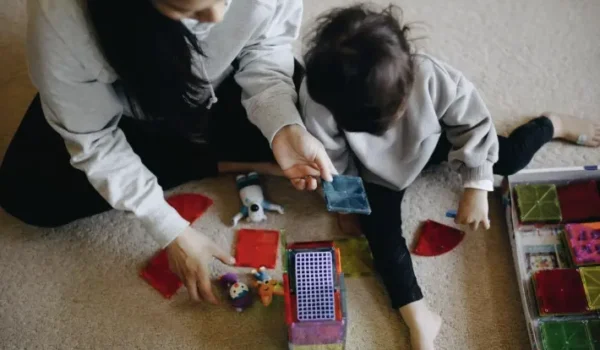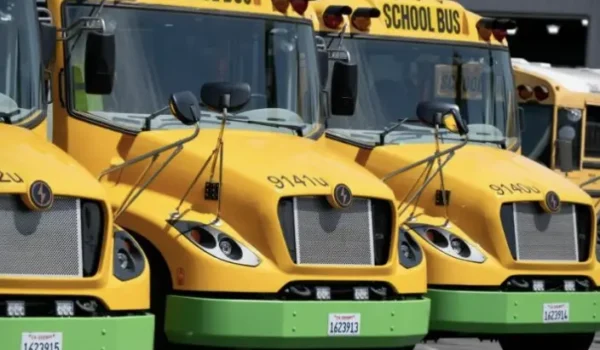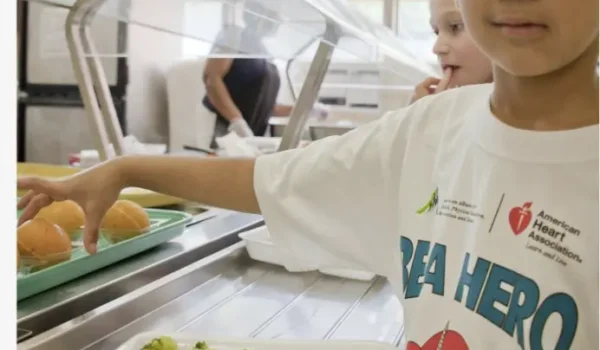Would you put children on an autonomous school bus?
Ok, let’s put a pin in that question for a moment.
The universal image for education is the yellow school bus: one driver and a bunch of kids trundling off to school. The image is pervasive because the model to transport students to school has remained stagnant for generations. Your grandparents, no matter how old you are, would be able to navigate the school transportation system because it’s pretty much the same as when they went to school.
Last year Jennifer O’Neal Schiess and Phillip Burgoyne-Allen of Bellwether Education Partners scoured the nation for innovative school transportation ideas and did not unearth much. In their report Miles to Go: Bringing School Transportation into the 21st Century, they determined that “the state of school transportation service is grim.”
Transportation costs continue to rise, it’s harder to find bus drivers, and more students and families exercise choice, attending schools outside of their neighborhood. But transportation systems remain stubbornly unchanged. Schiess and Burgoyne-Allen determined that the school transportation models could be boiled down to a district-provided yellow bus, a private-company yellow bus, public transit, or some combination of those three. A yellow bus is a yellow bus no matter who administers it, and public transit works better for student in communities where the routes are near schools and buses run frequently on those routes in the morning and afternoon.
Nonetheless, privatizing school bus service in Colorado is still rather uncommon, and therefore newsworthy. In late October, the Greeley-Evans School District 6 announced it was considering privatizing its bus service, which would make it the fifth district to do so. If its school board approves the decision, Greeley will become the largest school district (22,325 students in 2017-18) with the largest transportation budget ($6.7 million) in Colorado to switch to private busing. The other four Colorado districts that already went this route include: Mesa County Valley School District 5, Pueblo City Schools 60, Montrose County School District RE-1J, and Woodland Park School District RE-2. Greeley 6 won’t save any money by privatizing; it just no longer has to run a transportation system.
Internet polls need to be taken with a grain of salt (see Boaty McBoatface), but the Greeley Tribune asked its readers to weigh in on privatizing the school district’s bus service. Roughly 38% said it worried them, 33% were fine with it, and 28% went with “back in my day we had to walk uphill both ways.” Nonetheless, there is some concern about who runs a bus service. If people in Greeley have trust issues about private companies providing yellow bus service, then they certainly will have trust issues with an autonomously driven vehicle.
Americans are very much taking a wait-and-see attitude to driverless vehicles. A recent Brookings Institute survey found only 1 in 5 people would ride in an autonomous vehicle. Seems reasonable to think that public support for an autonomous school bus would be significantly lower than that figure.

Source: Greeley Tribune, November 6, 2018
No matter who is in charge, running a yellow school bus in Colorado is expensive. It’s also optional, since Colorado law does not require schools to provide transportation to school. Here’s a quick sampling of several large districts in student population and acreage as examples. Worth keeping in mind: JeffCo charges a bus fee, and Denver does not provide transportation to most high schoolers.
Transportation Budgets for 2018-19 school year
- JeffCo: $26,906,820
- Denver: $26,600,000
- Douglas County: $21,257,651
- Poudre: $10,472,982
- Adams-Arapahoe 28 J (Aurora): $8,683,000
- Brighton 27J: $6,639,576
- Colorado Springs 11: $5,313,588
Districts and schools spend a lot of money on transportation. But, they are not the ones doing the heavy lifting. Who is probably the biggest provider of transportation to school? Parents and guardians.
A 2014 survey of Denver Public School parents, conducted by the Center on Reinventing Public Education, found that 64% of parents drive their children to school. If you’ve ever been near a DPS school at the start or end of the day, that number might seem too low. It’s gridlock out there in the school zone.
Denver had the highest response of parent drivers in that survey, but 50% or more of parents in Cleveland, Detroit, and New Orleans also reported driving their students to school. That’s a lot of extra time on the road and a logistical challenge. But for parents with neither a flexible work schedule nor a car, driving children to school is not an option.
State law allows families to choose to attend public schools in any Colorado school district, not just their assigned school. A recent report by Ready Colorado – Open Doors, Open Districts – found that more than 95,000 students chose a different school within their district, and roughly 50,000 students chose to attend a public school across district lines. If you remove transportation as a barrier, how many more students would search for a school that better fits their needs? I’m not sure we – students, families, schools – are ready for autonomous buses, but imagine how many kids could be in better learning opportunities if we were. How much longer do we have to wait to find out?
School districts are spending greater sums on transportation, and parents are shouldering a heavier load of that work as well, which gets us back to the original question. Would you put children on an autonomous school bus?
Five families near Fort Meyers in southwest Florida said “yes” earlier this fall. In a limited test, five students rode an autonomous shuttle bus to school once a week. Transdev developed the pilot, so the drive was three blocks long, the shuttle never topped 8 mph, and a safety monitor (person) rode in the shuttle.
In late October 2018, five weeks into a six-week pilot, the National Highway Traffic Safety Administration slammed the brakes on the shuttle service. Heidi King, NHTSA deputy administrator said in a statement that using a non-compliant test vehicle to transport children is irresponsible and inappropriate. The school bus pilot is stopped for now, but Transdev is running a shuttle pilot between the University of Florida and downtown Gainesville, Florida and another with the Jacksonville Transit Authority.
And there’s more school shuttle ideas coming. Teague, a design firm in Seattle, has an autonomous school shuttle concept, Hannah. Teague designers envision a six-student shuttle with sliding doors and ramps on both sides. The shuttle won’t have a front or back, so students would be able to enter from either side. The shuttle would improve efficiency by operating with a point-to-point route and improve safety by meeting students at their residence.
In an interesting twist, since most school buses are parked 90 percent of the time, Teague envisions the Hannah shuttle with a dual purpose as a delivery vehicle. Most school buses run two routes and then are parked at the bus barn. Teague sees the shuttle doubling as a roaming delivery service for retailers, which could subsidize the cost for schools and districts or potentially pay for the entire school shuttle service.
Teague is exploring serious questions pertaining to autonomous vehicle technology, student bullying, safety procedures, and inclusive design. Lots to unpack, but the possibility of providing transportation to all Colorado students is intriguing. The nation’s largest transit system – the school bus – is ripe for innovation, and autonomous school buses will certainly be part of the conversation.
Contact Matt



